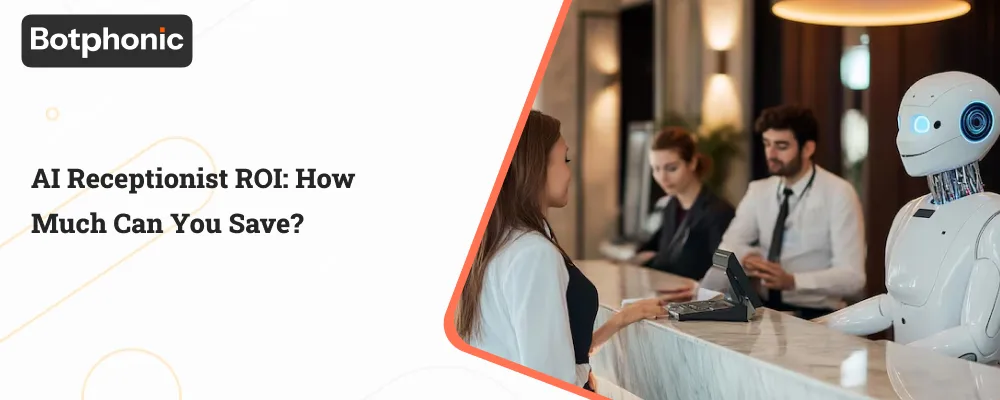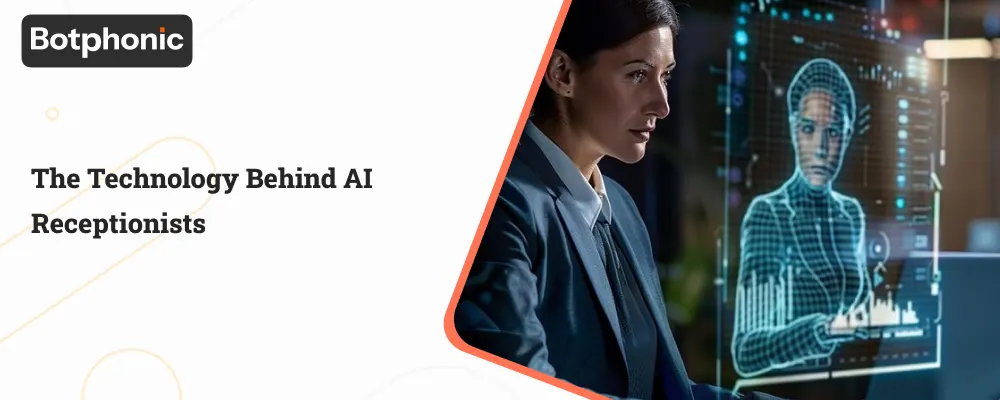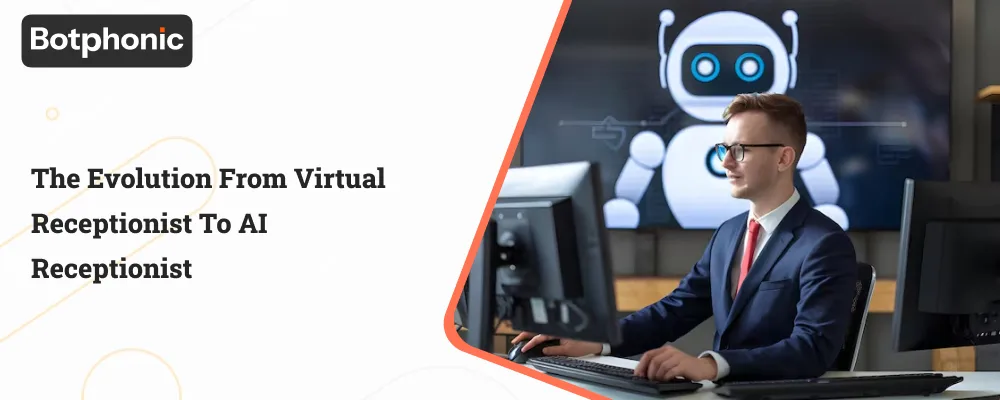
Summarize Content With:
Quick Summary
These days, many businesses are leveraging AI receptionists, but have you wondered what was before that? How has AI evolved, and how has it helped businesses over the past few years? In this blog, we will be uncovering these questions and will help you know:
- AI receptionist history that shows nothing but progress
- The virtual receptionist helped with problems, but created a few in the process
- How modern AI receptionists became a game-changer
- Future with AI receptionist: an overview
Introduction
These days, the way businesses are handling their customer communication has taken a 180 It has changed dramatically compared to the past decade. Smart AI receptionists have evolved from traditional front-desk receptionists and remote virtual receptionists. This evolution from virtual receptionist to AI receptionist has reshaped the expectations of customer service significantly.
A simple call forwarding service has now evolved into advanced AI receptionist software. Effectively offering to never miss a call with a 24/7 call handling service. Let’s get into its history and understand how businesses have moved from manual operations to smart operations. AI-based virtual receptionists with round-the-clock support have shifted the page to reduce errors and improve speed while delivering a more cost-effective solution.
Virtual Receptionists Before AI
Before AI receptionists became famous, businesses used to rely on manual work operations or human-powered virtual receptionists. Allowing companies to outsource call handling, appointment scheduling, and even resolving customer queries without any requirement for a full-time or in-office receptionist. Even for a small business AI receptionist has become a game-changer, offering flexibility and reducing overhead costs.
However, virtual receptionists have their own limitations. Even the companies that hired almost the best team with their resources struggled with missed leads and lost revenue. Factors influencing missed calls are time-zone differences, limited staffing, or even the calls that were made after business hours.
While the traditional virtual receptionists provide a personal touch, they might not be one of the cost-effective solutions for businesses that are still growing. Even human receptionists are prone to fatigue and errors with inconsistent service, which might lead clients to move to companies that offer better, consistent support.
The Birth of AI Receptionist Technology
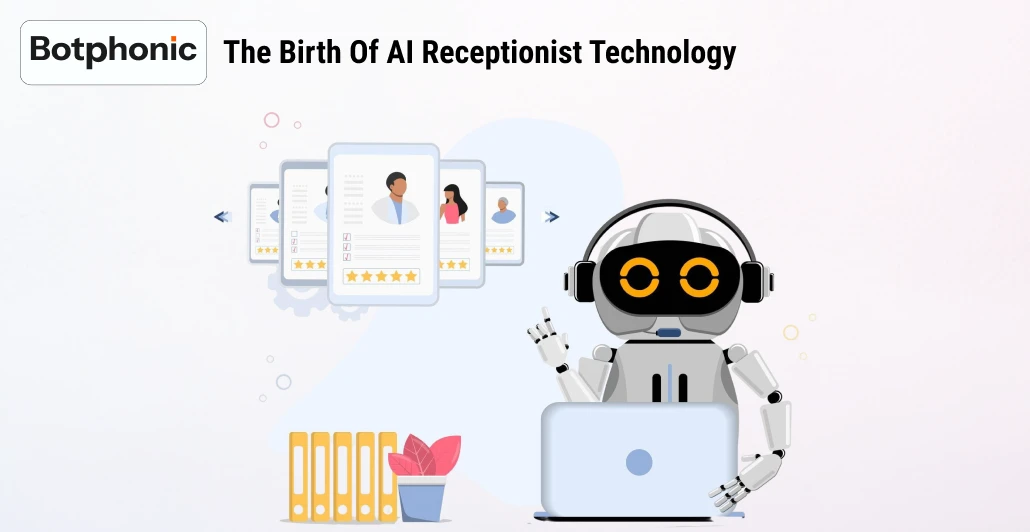
The limitations of traditional virtual receptionists have given way to AI receptionists to develop more effectively. With the advancement in technologies such as machine learning, NLP, and speech recognition, businesses notice the potential of a digital AI call assistant that can easily operate 24/7 without getting fatigued.
The early version of AI receptionist software typically focused on simple tasks such as answering FAQs or routing calls. AI receptionist prompting technology has evolved and improved over time, and even the systems are becoming smarter. And now they can easily interpret the context, personalize the interactions. For companies integrating an AI-based virtual receptionist with round-the-clock support meant that they are now capable of achieving a 24/7 call handling system that too without adding any expense of maintaining a whole team.
The most miraculous breakthrough was when an AI receptionist integrated with appointment scheduling platforms and CRM platforms. This feature allowed companies to streamline operations and also helped improve customer interaction. Additionally, shares powerful analytics which is especially tailored for business. Earlier, with traditional receptionists, this used to be a task that was managed by not one but a large team, but it can now be done with an affordable 24/7 AI virtual receptionist.
Let’s check out the timeline of an AI receptionist to know about it more effectively.
Mini Timeline of AI Receptionist History
- 1990s: Early IVR (Interactive Voice Response): Businesses began using automated phone menus, but these often frustrated callers with limited options.
- 2000s: Virtual Receptionist Services: Human-operated services gained popularity for small businesses but still led to missed leads & lost revenue after hours.
- 2010–2015: Rise of Voice Assistants: Advances in Siri, Alexa, and Google Assistant set the foundation for conversational AI.
- 2016–2019: AI Receptionist Software Emerges: Basic AI call assistants entered the market, offering call routing, FAQs, and appointment booking.
- 2020s: Intelligent AI Receptionists: Modern systems like OpenAI launched GPT-3. Trendy and modern AI receptionist software, such as Botphonic AI receptionist, that delivers affordable 24/7 AI virtual receptionist solutions, with natural-sounding voices, best-rated AI virtual receptionist voice technology, and script customization services for specific industries.
AI Receptionist History: Key Milestones
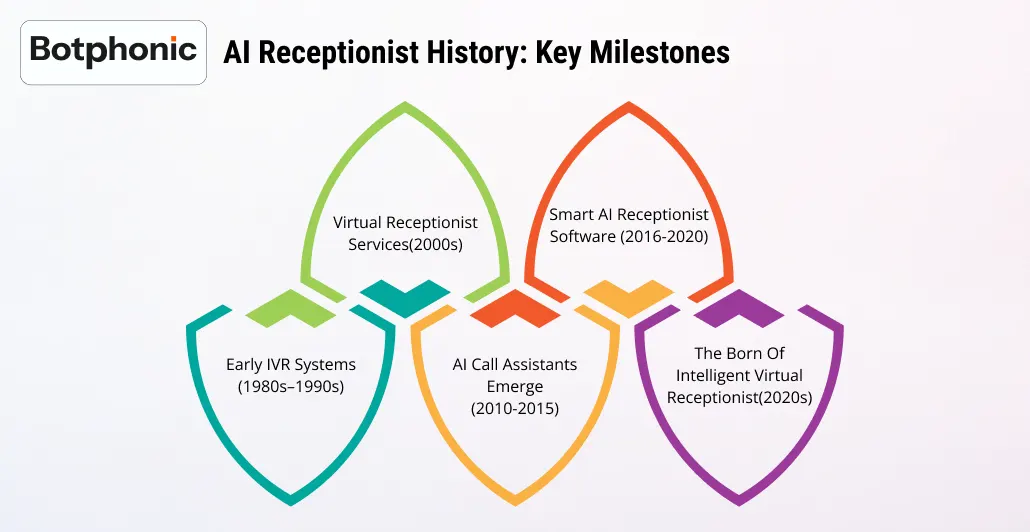
The story of these AI receptionists is tied really closely with the broader advancements in artificial intelligence, voice recognition, and also natural language processing. Let’s check out the key milestones of AI receptionist history and know the details:
1. Early IVR Systems (1980s–1990s)
- Interactive Voice Response (IVR) first introduced the automated menu option, such as press 1 for balance, press 2 for support, press 3 for exit.
- Companies were able to become efficient, but it led a few customers to frustration with a rigid interaction.
2. Virtual Receptionist Services(2000s)
- For small businesses, these outsourced virtual receptionist have become a favorite option and have also become their favourite instantly.
- Offered human touch still sometimes it did lead to missed leads, which resulted in lost revenue.
3. AI Call Assistants Emerge (2010-2015)
- First call assistance was designed with the help of speech recognition advancements.
- The system was able to answer FAQs, escalate calls, and help with the performance of basic tasks, helping to reduce errors and improve efficiency.
4. Smart AI Receptionist Software (2016-2020)
- Introducing AI receptionist prompting technology, which helps systems to know the context, and create a personalized experience while syncing with the best appointment scheduling software with AI receptionist features.
- Businesses were now at ease as they were able to achieve a 24/7 call handling AI receptionist who helped them at a fraction of the cost.
5. The Born of Intelligent Virtual Receptionist(2020s)
- Modern platforms now introduce natural-sounding voices, which are also considered best best-rated AI virtual receptionist voice technology with advanced script customization services.
- Companies now have access to one of the most reliable AI receptionists available 24/67, helping them that no opportunity is slipping.
Core Benefits Driving AI Receptionist Adoption
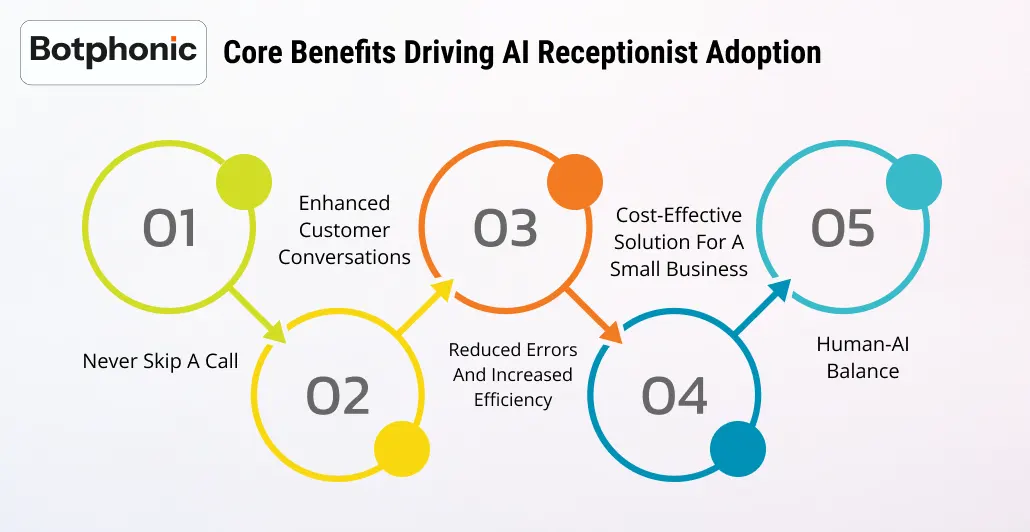
With the rapid adoption of AI receptionists, businesses are now gaining a measurable advantage that’s going even beyond cost savings. Combining AI receptionist software with AI call assistant technology, along with AI receptionist integration, is allowing businesses to serve their customer in a new and unique way.
1. Never Skip a Call
- With a 24/7 smart assistant AI receptionist, they ensure every call is answered and there are no missed leads.
- Customers are welcomed with a warm greeting, and their issues are resolved quickly.
2. Enhanced Customer Conversations
- Modern AI virtual receptionists are using natural and conversational voices, which helps create a positive first impression.
- Ensuring to have the best AI virtual receptionist voice technology, firms are now able to deliver warm and professional interactions that feel almost human-like while still working with automation.
3. Reduced Errors and Increased Efficiency
- There were chances that a traditional receptionist might forget some details or even misplace the messages. Whereas AI receptionist prompting technology ensures that there is accuracy in call summaries and even in message taking.
- With this AI receptionist is able to increase efficiency and speed, that too is a much more effective solution for peak business hours.
4. Cost-Effective Solution for a Small Business
- Hiring a full-time staff to provide 24/7 coverage can be an out-of-budget solution for startups and small businesses, and it might also be considered rather unrealistic.
- Whereas having an affordable 24/7 AI virtual receptionist provides enterprise-level support in the budget, making it a suitable option for small businesses.
5. Human-AI Balance
- Artificial intelligence’s goal is never to replace a human but to help them complete their task more efficiently, allowing them to focus on important matters.
- An AI receptionist is able to handle repetitive tasks such as picking up calls and answering FAQs, qualifying leads, and even booking appointments, whereas human staff can focus on matter that needs empathy and emotional intelligence.
The Future With AI Receptionists
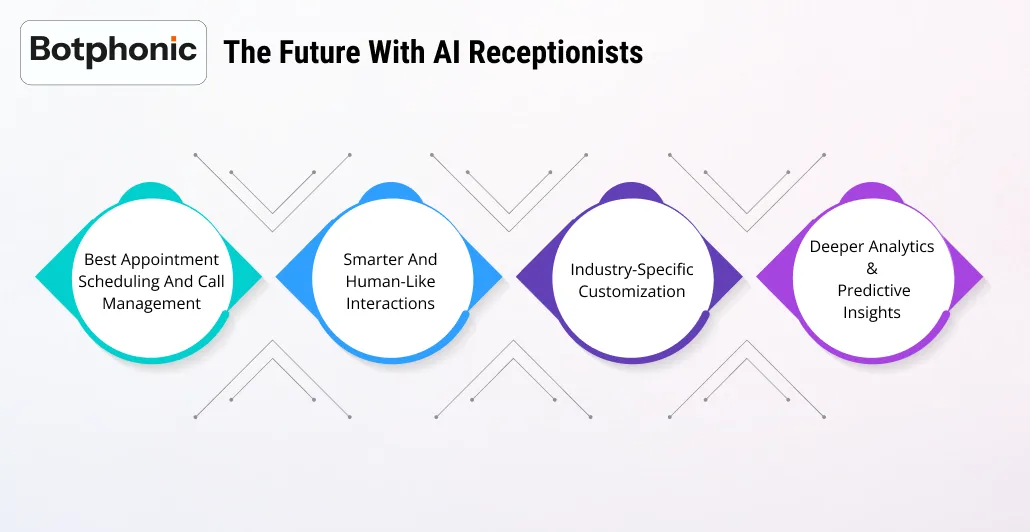
Being in a competitive business, having an AI receptionist is not just a “good option” but a necessity that not only works for you but also gives you a competitive edge over your competitors. Every firm, whether it’s a startup or an enterprise-level company, integrates AI receptionist software within its daily operations to ensure that they are always on call. Let’s see what more this AI receptionist offers:
1. Best Appointment Scheduling and Call Management
One of the most appealing features of an AI receptionist is seamless scheduling, integrating the best appointment scheduling software with AI receptionist features, which helps businesses automate booking, share reminders, and even helps with reschedule of the same. Effectively reducing the risk of any error or double booking, while ensuring that customers are escalated to the right department without any delays.
2. Smarter and Human-Like Interactions
These days, AI virtual receptionists are effectively optimizing voice synthesis and using contextual understanding to know the intent behind customers’ queries. Having the best-rated AI virtual receptionist voice helps brands make a voice that’s really difficult to differentiate from a human.
3. Industry-Specific Customization
As businesses are demanding personalization more and more, as per their industry’s needs, providers are also going to offer a top-rated AI virtual receptionist script customization service. That will obviously help firms that are into medical practice, law firms, real estate agencies, and small businesses, too. Having the best AI receptionist script customization provider will ensure that the conversations reflect the brand’s unique voice and suit compliance needs.
4. Deeper Analytics & Predictive Insights
Having a future-oriented AI receptionist won’t just help you with call handling, but will also help you predict customer needs. Having powerful analytics that is especially tailor to your business, companies will be able to have actionable insights. They can make decisions based on the analytics to determine customer behaviour, sales opportunities, and even the service gaps.
Upgrade to an AI virtual receptionist with top lead qualification features and watch your customer experience soar.
Try Now!!Conclusion
Learning about the history of AI receptionists allows people to learn that AI is not the sole reason that helps businesses grow. A hybrid approach lets businesses grow in both ways, as a business that offers employment to people in need and also helps customers effectively by becoming a tech-savvy brand. It proves that they are not old-fashioned but effective, progressing with the times.
The evolution from virtual receptionist to AI receptionist is a long journey that covers handling calls to sharing actionable analytics regarding customers’ behavior to make a strategy that suits the customer and the brand. Companies are now getting 24/7 coverage, which is tailor to meet their industry needs. While maintaining the brand’s tone and image.
